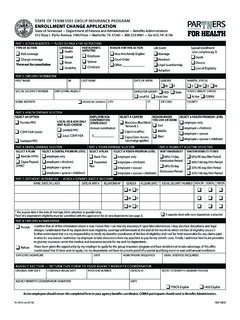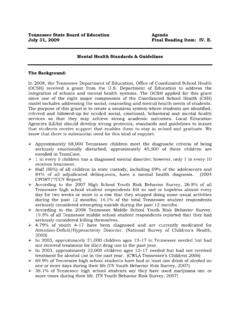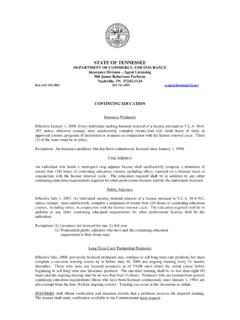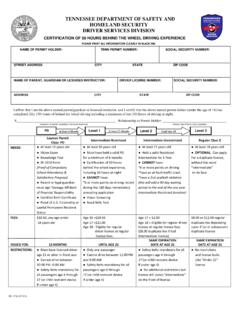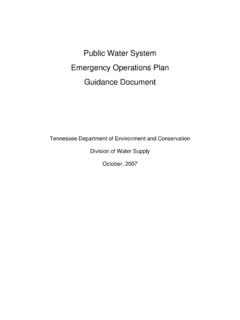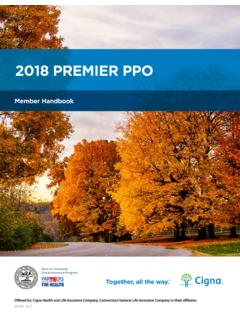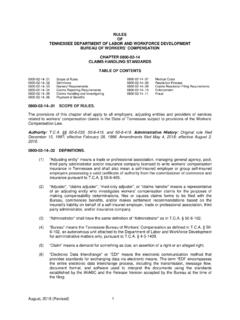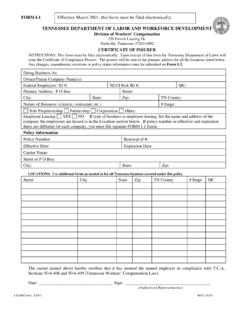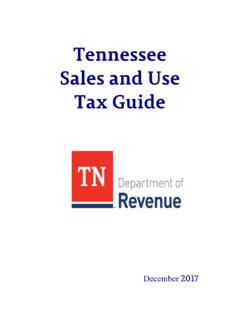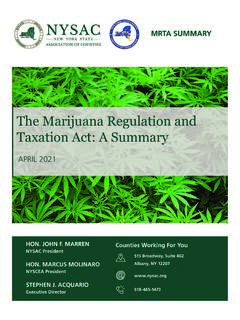Transcription of Annual Report 2020-2021
1 1 2020-2021 Annual Report Tennessee Department of Revenue| Annual Report 2 Table of Contents I. Letter from the Commissioner II. Mission, Vision and Values III. About the Department of Revenue IV. Organization of the Department of Revenue V. Revenue Divisions VI. Year in Review VII. Legislative Highlights VIII. Annual Accomplishments IX. Tax Data: Where Does the Money Go? X. Employee Talent Management and Development XI. Contact the Department 3 I. Letter from the Commissioner As we look back on this year, I want to share my deep appreciation for the employees of the Department of Revenue, our colleagues throughout state and local government, and the taxpayers that we serve. We have worked together to support Tennessee and its citizens. In addition to facilitating the distribution of roughly $197 million to businesses through the Tennessee Business Relief program in fiscal year 2021, the Department was honored to also help distribute more than $100 million through the Supplemental Employer Recovery Grant Program (SERG).
2 This second wave of small business funding included specific support for minority-owned, women-owned, and service-disabled veteran-owned businesses. As the Department continued to fine-tune its operations in response to working remotely, we saw production exceed pre-pandemic levels, processes quicken, and customer compliments increase. We were also able to provide additional online services to our customers. Our Taxpayer Services team began offering free tax webinars to the public each month, and we partnered with our Strategic Technology Solutions team and the Governor s Office of Customer Focused Government to add a personalized license plate application to the MyTN app. Finally, we revamped our TNTAP tax filing website to be more streamlined and easier to navigate. The collection of state and local revenue to help fund public services has never been more important, and I look forward to continuing to work along side you in the coming year.
3 David Gerregano 4 II. Mission, Vision and Values For a better understanding of what shapes the Department of Revenue s work, read about our mission, vision, and values. Our Mission: The mission of the Department of Revenue is to fund public services through tax compliance and motor vehicle registration by providing education, fair enforcement, and excellent customer service. Our Vision: Our vision is to achieve the highest level of employee engagement and efficiency in revenue collection using forward-thinking leadership and innovative systems. Our Core Values: Integrity: We are honest and ethical. Respect: We honor different perspectives and treat people with courtesy. Responsiveness: We react timely and positively to customers and co-workers. Collaboration: We work together to creatively solve problems and achieve shared goals.
4 Accountability: We take responsibility for our actions. Professionalism: We perform to the highest standards of conduct. 5 III. About the Department The Tennessee Department of Revenue serves as the state s primary tax collection agency, administering more than 25 different taxes and fees. In addition to tax collection and enforcement, the department is responsible for administering Tennessee s motor vehicle registration and title laws. During the 2020-2021 fiscal year, the department collected nearly $ billion in state taxes and fees. The department also collected more than $ billion in taxes for local, county, and municipal governments. The Department of Revenue has an Annual budget of approximately $128 million. About 25% of the department s budget comes from fees for services provided to local governments.
5 75% derives from state appropriations. The department s expenditures breakdown as follows (see chart below): 6 The department s functions include: Collection and apportionment of $ billion in revenues annually Administration of Tennessee s motor vehicle title and registration laws Promotion of voluntary compliance with Tennessee tax laws through taxpayer education and customer service Fair and practical administration of tax policy Compliance-focused audits of taxpayers across all tax types Collection of delinquent tax revenues, with a focus on promoting voluntary tax compliance tobacco regulation and diligent enforcement (in conjunction with the Attorney General s Office) Investigation of criminal tax fraud cases and assisting district attorneys with criminal tax fraud prosecutions Motor vehicle anti-theft inspections and investigations Administration of Tennessee s motor vehicle insurance verification law Lockbox services for other state agencies 7 IV.
6 Organization of the Department To learn more about Revenue s executive leadership team, read their biographies here. 8 V. Divisions More than 800 people work for the Department of Revenue to: educate and assist taxpayers, administer the state s motor vehicle title and registration laws, conduct tax research and economic analysis, enforce tax laws fairly and consistently, and process returns and other documentation. Read more about each one of Revenue s divisions and what they do: Administration Division: The Administration Division includes the Communications, Legislation, Policy, Financial Control/Fiscal, Hearing, Human Resources, Internal Audit, Legal, Research, and Special Investigations offices: Communications: The Communications Office creates and executes the department s communication s strategy.
7 This includes press releases, media inquiries, social media, video content, website information, and written information mailed to taxpayers. Financial Control/Fiscal: This office coordinates the department s fiscal functions, including allocating tax revenues to local governments. The office develops and administers an Annual budget, risk assessments, ensures appropriate segregation of duties, and monitors cash flow. Hearing: The Hearing Office works with taxpayers through informal conferences to resolve disputes about tax assessments and tax refund claim denials. Hearing Office personnel are required to exercise independent judgment and to render decisions on individual issues based on the facts and the law. Human Resources: The Human Resources Office serves as a resource to employees and management regarding policy and procedural interpretations.
8 This office serves to assist with Department of Human Resources related transactions, such as compensation, payroll, benefits, and employee relations issues. 9 Internal Audit: The Internal Audit Office conducts operational and financial audits to ensure compliance with federal , state, and departmental regulations , as well as testing and consulting services regarding the safeguard of state and federal tax information. Legal: The Legal Office supports the attorney general s office who handles more than 75 tax litigation cases a year. It also drafts tax rulings and legislation, and provide legal counsel on all matters involving the department. The office ensures the state s best interests are protected while providing a high level of customer service. Legislation: This office coordinates the department s legislative affairs and serves as a liaison between the Governor s Office and the General Assembly.
9 The legislative team reviews and analyzes proposed legislation, communicates the effect of proposed legislation to members of the General Assembly, facilitates the communication of the department s initiatives, and assists in resolving constituent issues. Tax Policy: The Office of Tax Policy reviews federal tax law updates, state regulations , and rulings to determine any impact changes may have on taxpayers and the department. The policy team is primarily responsible for many website publications, including important notices, tax manuals, and tax articles. The policy team is also responsible for researching complex tax issues and advising taxpayers and the department of potential impacts. Research: This division conducts tax research and economic analyses to assist decision makers in other areas of state and local government.
10 The Research division estimates potential revenue impacts of proposed legislation, helps develop state tax revenue forecasts, and evaluates comparative tax policies to determine fiscal effects. Special Investigations: Revenue s Special Investigations (SI) Division s primary mission is to investigate internal and external attempts to corrupt tax administration, vehicle salvage and rebuilt titling schemes, civil and criminal violations relating to key tax commodities, and workplace harassment. 10 Audit Division: The Audit division is the largest division in the Department of Revenue with more than 300 employees. There are seven field offices across Tennessee and five offices in cities across the United states . E mployees perform field and office audits of all tax types and process refund claims and penalty waiver applications. The division reviews taxpayer records to determine compliance with state tax laws and educates taxpayers about tax requirements.
